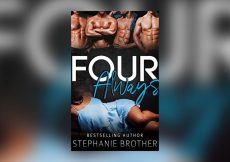Carolina Ciucci is a teacher, writer and reviewer based in the south of Argentina. She hoards books like they’re going out of style. In case of emergency, you can summon her by talking about Ireland, fictional witches, and the Brontë family. Twitter: @carolinabeci
View All posts by Carolina Ciucci
Carolina Ciucci is a teacher, writer and reviewer based in the south of Argentina. She hoards books like they’re going out of style. In case of emergency, you can summon her by talking about Ireland, fictional witches, and the Brontë family. Twitter: @carolinabeci
View All posts by Carolina Ciucci
Carolina Ciucci is a teacher, writer and reviewer based in the south of Argentina. She hoards books like they’re going out of style. In case of emergency, you can summon her by talking about Ireland, fictional witches, and the Brontë family. Twitter: @carolinabeci
View All posts by Carolina Ciucci
Carolina Ciucci is a teacher, writer and reviewer based in the south of Argentina. She hoards books like they’re going out of style. In case of emergency, you can summon her by talking about Ireland, fictional witches, and the Brontë family. Twitter: @carolinabeci
View All posts by Carolina Ciucci
Carolina Ciucci is a teacher, writer and reviewer based in the south of Argentina. She hoards books like they’re going out of style. In case of emergency, you can summon her by talking about Ireland, fictional witches, and the Brontë family. Twitter: @carolinabeci
View All posts by Carolina Ciucci
Carolina Ciucci is a teacher, writer and reviewer based in the south of Argentina. She hoards books like they’re going out of style. In case of emergency, you can summon her by talking about Ireland, fictional witches, and the Brontë family. Twitter: @carolinabeci
View All posts by Carolina Ciucci
Carolina Ciucci is a teacher, writer and reviewer based in the south of Argentina. She hoards books like they’re going out of style. In case of emergency, you can summon her by talking about Ireland, fictional witches, and the Brontë family. Twitter: @carolinabeci
View All posts by Carolina Ciucci
Carolina Ciucci is a teacher, writer and reviewer based in the south of Argentina. She hoards books like they’re going out of style. In case of emergency, you can summon her by talking about Ireland, fictional witches, and the Brontë family. Twitter: @carolinabeci
View All posts by Carolina Ciucci
Carolina Ciucci is a teacher, writer and reviewer based in the south of Argentina. She hoards books like they’re going out of style. In case of emergency, you can summon her by talking about Ireland, fictional witches, and the Brontë family. Twitter: @carolinabeci
View All posts by Carolina Ciucci
Carolina Ciucci is a teacher, writer and reviewer based in the south of Argentina. She hoards books like they’re going out of style. In case of emergency, you can summon her by talking about Ireland, fictional witches, and the Brontë family. Twitter: @carolinabeci
View All posts by Carolina Ciucci
Carolina Ciucci is a teacher, writer and reviewer based in the south of Argentina. She hoards books like they’re going out of style. In case of emergency, you can summon her by talking about Ireland, fictional witches, and the Brontë family. Twitter: @carolinabeci
View All posts by Carolina Ciucci
Carolina Ciucci is a teacher, writer and reviewer based in the south of Argentina. She hoards books like they’re going out of style. In case of emergency, you can summon her by talking about Ireland, fictional witches, and the Brontë family. Twitter: @carolinabeci
View All posts by Carolina Ciucci
Carolina Ciucci is a teacher, writer and reviewer based in the south of Argentina. She hoards books like they’re going out of style. In case of emergency, you can summon her by talking about Ireland, fictional witches, and the Brontë family. Twitter: @carolinabeci
View All posts by Carolina Ciucci
Carolina Ciucci is a teacher, writer and reviewer based in the south of Argentina. She hoards books like they’re going out of style. In case of emergency, you can summon her by talking about Ireland, fictional witches, and the Brontë family. Twitter: @carolinabeci
View All posts by Carolina Ciucci
Carolina Ciucci is a teacher, writer and reviewer based in the south of Argentina. She hoards books like they’re going out of style. In case of emergency, you can summon her by talking about Ireland, fictional witches, and the Brontë family. Twitter: @carolinabeci
View All posts by Carolina Ciucci
Carolina Ciucci is a teacher, writer and reviewer based in the south of Argentina. She hoards books like they’re going out of style. In case of emergency, you can summon her by talking about Ireland, fictional witches, and the Brontë family. Twitter: @carolinabeci
View All posts by Carolina Ciucci
Carolina Ciucci is a teacher, writer and reviewer based in the south of Argentina. She hoards books like they’re going out of style. In case of emergency, you can summon her by talking about Ireland, fictional witches, and the Brontë family. Twitter: @carolinabeci
View All posts by Carolina Ciucci
Carolina Ciucci is a teacher, writer and reviewer based in the south of Argentina. She hoards books like they’re going out of style. In case of emergency, you can summon her by talking about Ireland, fictional witches, and the Brontë family. Twitter: @carolinabeci
View All posts by Carolina Ciucci
Carolina Ciucci is a teacher, writer and reviewer based in the south of Argentina. She hoards books like they’re going out of style. In case of emergency, you can summon her by talking about Ireland, fictional witches, and the Brontë family. Twitter: @carolinabeci
View All posts by Carolina Ciucci
Carolina Ciucci is a teacher, writer and reviewer based in the south of Argentina. She hoards books like they’re going out of style. In case of emergency, you can summon her by talking about Ireland, fictional witches, and the Brontë family. Twitter: @carolinabeci
View All posts by Carolina Ciucci
Carolina Ciucci is a teacher, writer and reviewer based in the south of Argentina. She hoards books like they’re going out of style. In case of emergency, you can summon her by talking about Ireland, fictional witches, and the Brontë family. Twitter: @carolinabeci
View All posts by Carolina Ciucci
Carolina Ciucci is a teacher, writer and reviewer based in the south of Argentina. She hoards books like they’re going out of style. In case of emergency, you can summon her by talking about Ireland, fictional witches, and the Brontë family. Twitter: @carolinabeci
View All posts by Carolina Ciucci
Carolina Ciucci is a teacher, writer and reviewer based in the south of Argentina. She hoards books like they’re going out of style. In case of emergency, you can summon her by talking about Ireland, fictional witches, and the Brontë family. Twitter: @carolinabeci
View All posts by Carolina Ciucci
Carolina Ciucci is a teacher, writer and reviewer based in the south of Argentina. She hoards books like they’re going out of style. In case of emergency, you can summon her by talking about Ireland, fictional witches, and the Brontë family. Twitter: @carolinabeci
View All posts by Carolina Ciucci
Carolina Ciucci is a teacher, writer and reviewer based in the south of Argentina. She hoards books like they’re going out of style. In case of emergency, you can summon her by talking about Ireland, fictional witches, and the Brontë family. Twitter: @carolinabeci
View All posts by Carolina Ciucci
Carolina Ciucci is a teacher, writer and reviewer based in the south of Argentina. She hoards books like they’re going out of style. In case of emergency, you can summon her by talking about Ireland, fictional witches, and the Brontë family. Twitter: @carolinabeci
View All posts by Carolina Ciucci
Carolina Ciucci is a teacher, writer and reviewer based in the south of Argentina. She hoards books like they’re going out of style. In case of emergency, you can summon her by talking about Ireland, fictional witches, and the Brontë family. Twitter: @carolinabeci
View All posts by Carolina Ciucci
Carolina Ciucci is a teacher, writer and reviewer based in the south of Argentina. She hoards books like they’re going out of style. In case of emergency, you can summon her by talking about Ireland, fictional witches, and the Brontë family. Twitter: @carolinabeci
View All posts by Carolina Ciucci
Carolina Ciucci is a teacher, writer and reviewer based in the south of Argentina. She hoards books like they’re going out of style. In case of emergency, you can summon her by talking about Ireland, fictional witches, and the Brontë family. Twitter: @carolinabeci
View All posts by Carolina Ciucci
Carolina Ciucci is a teacher, writer and reviewer based in the south of Argentina. She hoards books like they’re going out of style. In case of emergency, you can summon her by talking about Ireland, fictional witches, and the Brontë family. Twitter: @carolinabeci
View All posts by Carolina Ciucci
Carolina Ciucci is a teacher, writer and reviewer based in the south of Argentina. She hoards books like they’re going out of style. In case of emergency, you can summon her by talking about Ireland, fictional witches, and the Brontë family. Twitter: @carolinabeci
View All posts by Carolina Ciucci
Carolina Ciucci is a teacher, writer and reviewer based in the south of Argentina. She hoards books like they’re going out of style. In case of emergency, you can summon her by talking about Ireland, fictional witches, and the Brontë family. Twitter: @carolinabeci
View All posts by Carolina Ciucci
Carolina Ciucci is a teacher, writer and reviewer based in the south of Argentina. She hoards books like they’re going out of style. In case of emergency, you can summon her by talking about Ireland, fictional witches, and the Brontë family. Twitter: @carolinabeci
View All posts by Carolina Ciucci
Carolina Ciucci is a teacher, writer and reviewer based in the south of Argentina. She hoards books like they’re going out of style. In case of emergency, you can summon her by talking about Ireland, fictional witches, and the Brontë family. Twitter: @carolinabeci
View All posts by Carolina Ciucci
Carolina Ciucci is a teacher, writer and reviewer based in the south of Argentina. She hoards books like they’re going out of style. In case of emergency, you can summon her by talking about Ireland, fictional witches, and the Brontë family. Twitter: @carolinabeci
View All posts by Carolina Ciucci
Carolina Ciucci is a teacher, writer and reviewer based in the south of Argentina. She hoards books like they’re going out of style. In case of emergency, you can summon her by talking about Ireland, fictional witches, and the Brontë family. Twitter: @carolinabeci
View All posts by Carolina Ciucci
Carolina Ciucci is a teacher, writer and reviewer based in the south of Argentina. She hoards books like they’re going out of style. In case of emergency, you can summon her by talking about Ireland, fictional witches, and the Brontë family. Twitter: @carolinabeci
View All posts by Carolina Ciucci
Carolina Ciucci is a teacher, writer and reviewer based in the south of Argentina. She hoards books like they’re going out of style. In case of emergency, you can summon her by talking about Ireland, fictional witches, and the Brontë family. Twitter: @carolinabeci
View All posts by Carolina Ciucci
Carolina Ciucci is a teacher, writer and reviewer based in the south of Argentina. She hoards books like they’re going out of style. In case of emergency, you can summon her by talking about Ireland, fictional witches, and the Brontë family. Twitter: @carolinabeci
View All posts by Carolina Ciucci
Carolina Ciucci is a teacher, writer and reviewer based in the south of Argentina. She hoards books like they’re going out of style. In case of emergency, you can summon her by talking about Ireland, fictional witches, and the Brontë family. Twitter: @carolinabeci
View All posts by Carolina Ciucci
Carolina Ciucci is a teacher, writer and reviewer based in the south of Argentina. She hoards books like they’re going out of style. In case of emergency, you can summon her by talking about Ireland, fictional witches, and the Brontë family. Twitter: @carolinabeci
View All posts by Carolina Ciucci
Zachary Thomas was a junior in college when he learned about The Carroll Ballers, a volunteer program where John Carroll University students play basketball and mentor youths at the Cuyahoga County Juvenile Detention Center. When they told him that the residents were interested in expressing themselves through writing, and asked him if he’d be willing to make that happen, he jumped at the idea.
“They couldn’t have certain conversations, they couldn’t have any sort of catharsis,” he said. “[R]eading and writing, I think, are fundamental for them to have that experience, to have the catharsis, to have that outlet. And it wasn’t in place. It’s kind of how the idea came to me: like okay, they are not given the time and place to do those activities, so can we create a space to do so?”
The pilot workshop was a collaboration with The Carroll Ballers, but due to the kids’ positive response, it soon took an identity of its own. Zachary, along with his co-founders Anthony Shoplik, Rachel Schratz, and Michalena Mezzopera, put into use what they had learned at school. As undergrads who had attended creative writing workshops throughout their college careers, they had a familiarity with the overall format. In their determination to create the very best workshops they could for the kids they’d be working with, they also leaned on their professors and advisors.
In 2018, with graduation looming, Zachary followed his mentor’s advice and applied to the Cleveland Foundation’s Anisfield-Wolf Book Awards Grant Fellowship. This grant was crucial in the expansion of a volunteer program into a full-on nonprofit
“We would not be here without initially Fellowship support,” he explained. “It was very successful. We expanded, sort of began to really think about, in a serious way, where we wanted Writers in Residence to go. Because at the time, we were just like ‘We’re just here in northeast Ohio, what does it look like us to be in other episodes across the State?’”
Book Deals Newsletter
Sign up for our Book Deals newsletter and get up to 80% off books you actually want to read.
Thank you for signing up! Keep an eye on your inbox.
By signing up you agree to our terms of use
They’ve had the opportunity to find out.
Writers in Residence now has 15 partnerships with juvenile facilities across the State of Ohio. The program rotates among the facilities, offering five to six active workshops in autumn and spring.
As the organization has grown, Zachary’s and his co-founders’ duties shifted. He is now the Executive Director of the organization, while they serve on the Board. “I do have a lot more admin duties […] that don’t involve me to be in the workshop, and that kinda sucks. [P]art of the reason why I love this work is because I get to work directly with the residents on a weekly basis writing and reading, and this is awesome,” he said.
Where he works less directly with residents, he does have a much bigger hand in ensuring the program’s ongoing success.
“I need to be meeting with donors, and writing grants, and making sure that strategically, our Board is in line with helping to achieve the goals that they task me to do, and all sorts of things. I try to do one workshop that I teach myself.” He says this is crucial for not only staying connected with the people the group aims to reach but also for knowing what’s happening on the ground. “I think anyone who is in charge should have this model, because otherwise you don’t know what’s happening laterally in your organization. I have an idea what the activities are, what the relationships are, etc. And partially, on a biased note, I have that because it’s what feeds me, even though the work that I’m doing is to feed the organization. So if I wasn’t teaching, I think I would lose sort of the passion and the love that I have for the work that we do, and that would also negatively affect my own leadership as a result.”
What does one of the workshops look like?
Each workshop lasts 12 weeks, a period during which they work on creative writing, primarily poetry. They’re led by Teaching Artists and Student Volunteers, who serve in a peer-mentor capacity. Over time, the initial familiarity with creative writing workshops, in general, has morphed into familiarity with creative writing workshops in juvenile facilities. As a result, they’ve streamlined their format. A typical meeting, lasting 60-90 minutes, includes five basic movements:
- Freewriting activity
- General discussion
- Talking about a brief literary work
- Prompts activity
- A shared piece
Still, the workshops allow for flexibility. Lesson plans abound, especially after five years, but in Zachary’s words, “a lesson plan is a safety plan.” He always knows what the plan is for that first workshop, but he makes sure to take his cues from the kids after that. The first encounter allows him to “kind of decide where we’re going to go, based on [factors like] the conversations that I had in that first workshop with the residents, sort of the energy or the vibe, if they’re still pretty anxious, pretty cautious, then I’m going to do something low-risk, light, but also engaging. Now, if they really loved that first workshop that I always do, then I’m like okay, they’re ready to go to the next level. So it’s adapting to where they are, pretty much.”
This is crucial, because in order for any creation to happen, the kids need to feel safe.
“We’re talking about youth who are in jail or in prison; a lot of the time they don’t want to show a different side of themselves to their peers, for the sake of protecting themselves, so we have to make sure that we’re creating a space for them to be authentic and genuine, feel safe but also vulnerable, not just for one resident but for everyone, because if everyone is not involved then it does affect the experience of one person overall,” he explained.
Latisha Lashay, a well-known local poet and Teaching Artist, has the same approach. She said that providing these kids with a sense of safety is her priority, because above all, she “want[s] these kids to know they have a choice.” To her, facilitating these is about “learning with them, learning how do I go about making sure these children feel safe, these children feel that the word consent belongs to them in this moment.”
One aspect crucial to Latisha’s approach when working with these kids is that she’s not their superior; she’s their equal.
“I’m learning with them creativity through poetry, I’m learning how to connect different things in different ways in different styles of poetry with parts of my community, with parts of my culture, with these kids.” She’s not the only one who finds reciprocity in these workshops: the vast majority of Student Volunteers, who come from Hiram College, John Carroll University, Baldwin Wallace University, and Heidelberg University, reported that the residents impacted them as much, or more than they impacted them.
An important part of the workshops is choosing the right textual material for the kids to read. Zachary has two selection criteria:
- Authors of diverse backgrounds: race, ethnicity, gender, geographic location, etc. This helps to make it more likely that the kids find something to relate to, especially because he makes sure to include authors who are local to the cities where they work.
- When he facilitates a workshop, he tries to select material that he himself enjoys. When the coordinator gets excited about the material, he said, they have a better chance of engaging the kids.
At the final workshop, the facilitators present the kids with that towards which they’ve spent 12 weeks working: a chapbook where their poetry — or artifacts, as they call them — is proudly gathered. It is a transformative experience.
“[I]t’s not until they see their own name, they see their own creative writing artifact in a chapbook, that they’re like ‘Oh! Like, wow. That’s literally what we’ve been doing all these weeks, like that’s so cool.’ They get very…They have so much pride and accomplishment in something that they’ve been doing for the last few weeks. It’s like a very great sense of pride,” said Zachary.
Haikus, rapping, and the healing power of poetry
The first thing that Latisha teaches the children is how to write a haiku. But she doesn’t initially tell them that that’s what they’re doing. Instead, she walks into the class and asks if anybody in there raps. Inevitably, some of them say yes.
[T]hen I’m like, I need you guys to write me a bar. But this is how I want you to do it. I want you to write me a couple of verses, but in the format of 5-7-5,” she said. Because she always emphasizes that they’re not obligated to do it, some of them simply hang around…at first. Then, “’cause they know they don’t have to, they’re kind of interested. And so in the end they do it, and we read them, and I’m like ‘Wow, this is dope,’ and then I say, ‘Congratulations, everybody, you ready?’”
She then writes a word and asks one of them to say it for her. “They say haiku, and I say ‘yes, congratulations, you just wrote your first haiku! You just wrote a Japanese style poem and you didn’t even know it.’ And just that sense of accomplishment, this thing that they didn’t even realize happened. ‘Congratulations, you guys, you’re poets!’”
Indeed, poetry is a key component of the work these kids do. When I first started reading about Writers in Residence, I spent quite a lot of time reading the chapbooks. What began as research soon became a moving, beautiful, transformative experience — one that happened pretty much exclusively through poems. When I mentioned this to Latisha, she said that “[T]here’s this quote from Pharrell, he’s in a group called N.E.R.D, and he did a song called “Lemon.” At the beginning of the song, he starts with ‘The truth will set you free/but first it will piss you off.’ And then I tell people, ‘I remember this quote that says “People hate poetry the same way they hate the truth.”‘ And so I say, poetry will set you free, but first it will piss you off. If music expresses how you feel, poetry confronts it. Poetry gives it a face, a name, and it forces you to sit with it, and call it out.”
Latisha, who was incarcerated when she was barely more than a kid herself, spoke about both the healing power of poetry, and the power of being seen as a person, not a number or a statistic. Before being incarcerated when she was around 20, she occasionally wrote poetry. At 21, she “ended up taking this class called Interpersonal Communication, and had this teacher called Heidi Arnold who liked to do this prompt [that] was like write where you were from, but using sensory things. And so I wrote where I was from using the sensory prompt, and she’s like ‘Wow! This could be a poem!’ And so I went back to my room, my cell, and then I started writing.”
When talking about the impact that poetry has had on her life, she didn’t mince words.
“Poetry allowed me to see myself. Poetry allowed me to be angry, to be in love, to be sad, to be frustrated. Poetry said “you are allowed to be these things, and no one will tell you that you are wrong.” I love poetry because poetry is the first piece of consent I truly understood, because I was allowed to consent to my feelings. And the only person who could tell me I was wrong was me,” she said. “I could take these words and I can say ‘I am done today’ and no one would say ‘you’re not allowed to give up,’ no one to say ‘you’re not allowed to cry,’ no one to say ‘that girl didn’t hurt your feelings’, yeah the fuck she did! Poetry…Poetry held me in a way I couldn’t hold myself. And the more I wrote, the more I learned it was me holding myself. It was me becoming a safe space for me, because poetry comes from you. So because it’s coming from me, it is me. And the safe space I created, is because I created a safe space for me. […] Poetry told me you are allowed to exist, and I realize it was me, in an adolescent mind, learning how to heal and deal in a system that was meant to destroy and break you down and be a number and not a person. It was me the whole time saying ‘I see you, Latisha. Here’s your home. Here’s your safe space.’”
She isn’t the only one who found a safe space in poetry and the sense of self and community it fosters. Over the past five years, the workshops have had a consistently positive effect. Post-workshop surveys conducted among the facilities’ staff revealed that a high percentage of the residents not only enjoyed their time with the Teaching Artists and Student Volunteers, but also began to approach conflict resolution in a healthier way, resorting to open communication. They continued to write, in their journals and otherwise, even after the program was over.
Maybe, through those 12 weeks of writing poetry, they learned the same things about themselves that Latisha did.
“Poetry taught me how to reparent myself. Poetry was my mom. Poetry was my dad. Poetry said I love you, and then it made me realize that it was me saying I love you this whole time. And so now, I tell these kids I love them, and I tell them poetry loves them. And then tell them they are poetry […] So, poetry loves you, and you are also poetry, what does that mean? That you love you too. You are more than just a number, you are words personified. You are expression, you are emotion, you are feelings, you are empathy, you are sympathy, you are compassion, you are kindness, you are anger, you are frustration, you are irritation; you are all these things, you’re not just one, you are all these things, and you’re all allowed to feel them in a healthy way. So that’s why poetry.”
The Reentry Mentorship Program
Writers in Residence created the Reentry Mentorship Initiative about a year and a half ago. They did it, as Zachary’s says because, “it’s irresponsible for anyone who works with anyone who is part of the justice system to not be providing them with any services when they get out.”
Enter Spencer Dolezal, the organization’s Reentry, Community Outreach, and Advocacy Director, who joined Writers in Residence in December 2021. His mission was to build a framework for a mentoring program meant to assist the kids in their reentry process. This program, which provides them with a Reentry Care Plan, is available to any youth who wants this mentoring and has parental or guardian consent.
Once a kid opts to participate in the program, they go through a registration process with a couple of state and federal assessments. Based on these assessments, which provide a “snapshot” of what the youth has been going through in the last 30 days, and what their risk factors for recidivism may be, respectively, they can determine the unmet needs that keep them from succeeding.
“Sometimes,” Spencer said, “it’s a little bit like throwing spaghetti at the wall and seeing what sticks.” Once they’ve identified those unmet needs that the child and family agree with, they “then turn [them] into goals. And so we take those three to five unmet needs, and we come up with three to five practical goals for the next year to 18 months. Some of the common goals that we see are that the child needs to accomplish the school year, or graduate from high school […] and we tie those goals back to the unmet needs.”
These unmet needs can be both material and emotional. When they involve services that the program doesn’t provide, Spencer explained that he and the mentors put the child and their family in contact with organizations that do, whether they’re food banks or counseling services. They also draw up an emergency plan for the family and inform them that staff are mandated reporters.
The child is also assigned a local adult mentor who is meant to be a stable presence in their life. Many of these youths report that a lot of the people in their lives have been inconsistent, so with the program, Spencer said, they’re “trying to get stable positive adult presences in as many of these young people’s lives. And we’re not replacing parents, we’re not replacing therapists; it’s just somebody who can build a strong relationship, who can then give advice, help their life skills, and then make that process of transitioning into adulthood a lot easier, because there is a trusted adult who can say ‘oh, this is how you do this thing, this is what you should do on a job application, this is who you should go to to file your taxes.’ These sorts of things.”
Something that makes the mentorship program stand out is that it doesn’t have an age limit. A youth who turns 18 continues to have access to the services provided and support to meet their goals. As Spencer puts it, they don’t “have an age-out criteria in our mentoring program, and we’re really intentional about that, because there are a lot of programs that are tied to a specific founding that don’t allow for young individuals over a certain age to participate, and we want to be a gap-filler, and so we are happy to serve young individuals who are going through that transitional age, and even after.”
A service of being
This is how Zachary describes the work that the organization does when he introduces a new person into a workshop: “I tell them, one of the reasons why we’re going in there is like a service of being, is in a service of doing, a service of fixing.” Because when it comes down to it, this — showing up, building relationships and fostering community, advocating for justice, practicing consistency — this is what Writers in Residence is ultimately about.
Make sure to check out the organization’s website in order to learn more about Writers in Residence, to make a donation, and to apply to be a Reentry Mentor.



























:quality(85):upscale()/2023/05/11/976/n/1922564/782262e2645d6b967847b4.74342194_.png)








